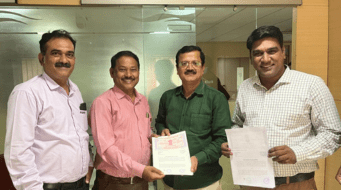By Asif Alam Mazumder in Madhya Pradesh, Odisha, Maharashtra and Jharkhand

Women self-help groups (SHGs) across the country are playing an important role in combating COVID-19. From sewing and distributing protective face masks, to running community kitchens and providing the right information, they have risen to overcome this extraordinary challenge. While the women in power are making their presence felt through decision-making bodies, SHG (self-help groups) have transformed into the eyes, ears and nose of the administration along with ASHA and Anganwadi workers.
WOTR’s women SHG members have been actively supporting village communities right from the outset. They have been working with families who need lifesaving hygiene essentials, carrying out awareness campaigns, helping in proving fact-based information, sewing and distributing masks and ensuring proper hand washing techniques, besides providing vulnerable families with packages of essential commodities.
SHGs instrumental in awareness and preparedness at the community level
In Madhya Pradesh, SHG members along with Wasundhara Sevikas have played an instrumental role by spreading awareness among women on preventive measures. SHG and Village Development Committee (VDC) members along with the concerned ASHA workers of the village demonstrated the importance of proper hand washing. After WOTR’s orientation drives, Wasundhara Sevaks and the VDC members, actively undertook awareness and preparedness measures at the community level. In the project villages of Mandla, Anuppur and Chhindwara, the SHG groups stitched and distributed protective face masks to over 1,600 villagers.

Earning a livelihood through mask making
In Odisha, the SHGs members in the Rayagada district are trying to meet the shortfall of protective masks. Following the state government order to provide a mask for each ration card holder, the Block authorities contacted the WOTR team in supervising and facilitating sewing of mask through SHGs. The raw material (fabric) was provided by the government. These SHG members are working tirelessly, sewing masks to meet a target of 5,000, as they earn some income for themselves. The masks would be sold at Rs 10 each.
Food packet distribution by Mahila Pravartaks
In Maharashtra, across the districts of Ahmednagar, Osmanabad and Raigad, SHG members and Mahila Pravartaks have been devoting their time in generating awareness, supplying essential commodities, cooking meals for the needy and even making masks every day. With huge numbers of informal workers losing their livelihoods during the lockdown and food supply chains disrupted in some areas, SHGs have distributed cooked food to feed stranded workers, the poor, and the vulnerable. The SHG women are also working in strengthening the Public Distribution System (PDS) to ensure smooth supply of food grains to needy families.

Distribution of meals through the Mukhyamantri Didi Kitchen Centre
In the villages of Jharkhand, SHG women are proactively working towards the provision of meals to the most vulnerable segment of the community. These women are successfully operating the Mukhyamantri Didi Kitchen Centre in various villages to feed the poorest of the poor and destitute with the support of the Jharkhand government and Jharkhand State Livelihoods Promotion Society.

The SHGs work both in rural and urban areas and are a vital link between the Government and the community thus strengthening service delivery at the grassroots. The SHGs are also assigned the responsibility of creating awareness on the coronavirus at the community level. They have circulated pamphlets mostly among women, who have little knowledge on hygiene and sanitation. They help the rural people understand in simple language that it is impossible to check the virus if they don’t stay at home and help break the virus’ transmission chain.
As communities unite to check the spread of COVID-19, strength of these rural women will continue to be quintessential in rebuilding the much-needed economic momentum after the pandemic is over.





